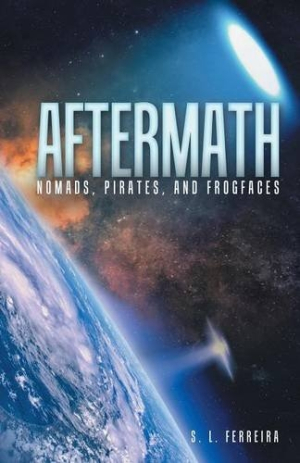
Aftermath
Nomads, Pirates, and Frogfaces
Introspection and cautionary tales run beneath the nonstop action of this interstellar adventure with a heart.
Hostile alien takeover, marauding scavengers, and fights for survival aside, Aftermath: Nomads, Pirates, and Frogfaces by S. L. Ferreira is a tale of endurance and heart. Culturally diverse but racially tense, a small group allies together, unaware that the fate of humanity rests in their hands.
When a peace-loving biology teacher finds himself in the middle of an apocalypse with a teenage son and no clear direction, he must learn to adapt and carry on with a little help from his friends. At least that’s what Albert tells himself as he struggles to stay true to his beliefs while holding together his evolving band of partners. They navigate their way down roads fraught with the ever-seeking, methodical extraterrestrials that are rounding up humans; violent factions fighting for resources; and potential leaders looking toward the future. Albert learns quickly that nothing in this new world is black-and-white.
Although clearly a science-fiction piece packed with plenty of original ET technology, designs, and motives, Aftermath stands apart thanks to its thoughtful portrayal of the internal struggles, passions, and corruptions faced by the core crew, and by touching on sensitive current events such as gun use and control, social and racial prejudice, and gender roles and relationships, particularly those between parent and child. Albert, a pacifist at heart, mourns the necessity of firearms for protection, and clashes with his son when the fourteen-year-old wants to join the fight.
Each member of Albert’s team shows a sensitivity to the dynamics involved, whether internal or external, and whether positive or negative. At times, however, the moral dilemmas seem to trivialize the physical concerns in what is, essentially, a battle for the survival of the human race. Despite comments about fatigue and hunger, Albert’s gang always seems to be ready with fruit, stews, barbecues, fresh vegetables, and even an unlikely portable brew kit for beer while on the lam. The women discuss fashion options, and accommodations crop up in the form of seaside resorts, hotels, well-stocked farms, and the like. Provisions are plentiful, including timely advice and assistance from a suspiciously benevolent and organized group led by the enigmatic agronomist and “public relations” specialist, Julia. All of this points to a somewhat optimistic view of post-apocalyptic living in terms of expectations for survival.
The core troubles for Albert and crew arise predominantly due to other humans. The aliens in the book are often an afterthought, as daily skirmishes are engineered by greedy and opportunistic men and women. There is perhaps a cautionary tale woven in among the worries over frog-like invaders. Bloody at times, but never gory or grisly, and interspersed with action sequences, escapes, and shoot-outs to balance the introspection, Aftermath offers a uniquely complete and intriguing adventure, even if it is a bit naive.
Science fiction fans, particularly those who question violence in its many forms, will appreciate Aftermath. A protagonist with integrity and sensitivity helps this novel to shine, even considering the book’s depiction of an uncertain future and its portrayal of the brutality and destructiveness of mankind.
Reviewed by
Pallas Gates McCorquodale
Disclosure: This article is not an endorsement, but a review. The publisher of this book provided free copies of the book and paid a small fee to have their book reviewed by a professional reviewer. Foreword Reviews and Clarion Reviews make no guarantee that the publisher will receive a positive review. Foreword Magazine, Inc. is disclosing this in accordance with the Federal Trade Commission’s 16 CFR, Part 255.
